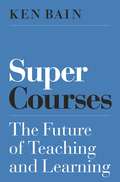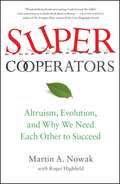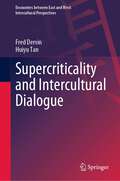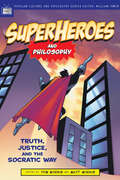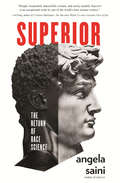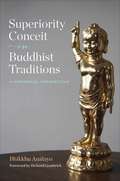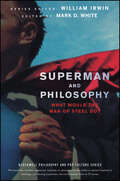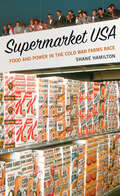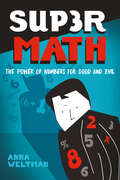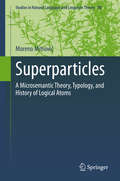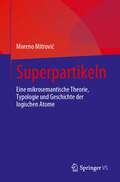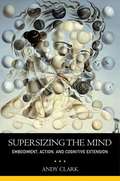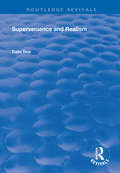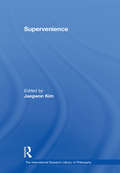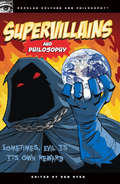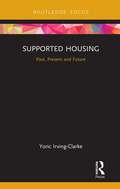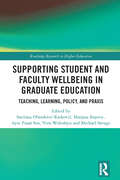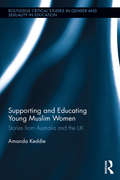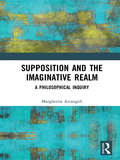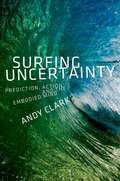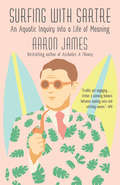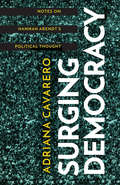- Table View
- List View
Super Courses: The Future of Teaching and Learning (Skills for Scholars)
by Ken BainFrom the bestselling author of What the Best College Teachers Do, the story of a new breed of amazingly innovative courses that inspire students and improve learningDecades of research have produced profound insights into how student learning and motivation can be unleashed—and it’s not through technology or even the best of lectures. In Super Courses, education expert and bestselling author Ken Bain tells the fascinating story of enterprising college, graduate school, and high school teachers who are using evidence-based approaches to spark deeper levels of learning, critical thinking, and creativity—whether teaching online, in class, or in the field.Visiting schools across the United States as well as in China and Singapore, Bain, working with his longtime collaborator, Marsha Marshall Bain, uncovers super courses throughout the humanities and sciences. At the University of Virginia, undergrads contemplate the big questions that drove Tolstoy—by working with juveniles at a maximum-security correctional facility. Harvard physics students learn about the universe not through lectures but from their peers in a class where even reading is a social event. And students at a Dallas high school use dance to develop growth mindsets—and many of them go on to top colleges, including Juilliard. Bain defines these as super courses because they all use powerful researched-based elements to build a “natural critical learning environment” that fosters intrinsic motivation, self-directed learning, and self-reflective reasoning. Complete with sample syllabi, the book shows teachers how they can build their own super courses.The story of a hugely important breakthrough in education, Super Courses reveals how these classes can help students reach their full potential, equip them to lead happy and productive lives, and meet the world’s complex challenges.
SuperCooperators
by Roger Highfield Martin NowakEVOLUTION IS OFTEN PRESENTED AS A STRICTLY COMPETITIVE ENDEAVOR. This point of view has had serious implications for the way we see the mechanics of both science and culture. But scientists have long wondered how societies could have evolved without some measure of cooperation. And if there was cooperation involved, how could it have arisen from nature "red in tooth and claw"? Martin Nowak, one of the world's experts on evolution and game theory, working here with bestselling science writer Roger Highfield, turns an important aspect of evolutionary theory on its head to explain why cooperation, not competition, has always been the key to the evolution of complexity. He offers a new explanation for the origin of life and a new theory for the origins of language, biology's second greatest information revolution after the emergence of genes. SuperCooperators also brings to light his game-changing work on disease. Cancer is fundamentally a failure of the body's cells to cooperate, Nowak has discovered, but organs are cleverly designed to foster cooperation, and he explains how this new understanding can be used in novel cancer treatments. Nowak and Highfield examine the phenomena of reciprocity, reputation, and reward, explaining how selfless behavior arises naturally from competition; how forgiveness, generosity, and kindness have a mathematical rationale; how companies can be better designed to promote cooperation; and how there is remarkable overlap between the recipe for cooperation that arises from quantitative analysis and the codes of conduct seen in major religions, such as the Golden Rule. In his first book written for a wide audience, this hugely influential scientist explains his cutting-edge research into the mysteries of cooperation, from the rise of multicellular life to Good Samaritans. With wit and clarity, Nowak and Highfield make the case that cooperation, not competition, is the defining human trait. SuperCooperators will expand our understanding of evolution and provoke debate for years to come.
Supercriticality and Intercultural Dialogue (Encounters between East and West)
by Fred Dervin Huiyu TanThis book offers a snapshot of interculturality as a complex, unstable and highly political object of research and education when it locates at the centre of multifaceted dialogues between teachers and students; students and students; teachers, students, scholars and readers. The context of the book is a Chinese course on intercultural communication education where students engage with local and international teachers. By listening to the intriguing and stimulating voices of these students in dialogue with the teachers, the reader also has the opportunity to enter the intercultural world of Chinese youth, beyond stereotypes. The unique approach proposed in the book is of interest to students, teachers of intercultural communication education, teacher educators, researchers and anyone wishing to build up supercriticality in relation to the fascinating notion of interculturality. The book contains 15 chapters and revolves around five main dialogues between the students and their teachers. Following each dialogue, the floor is given to the students to react to the dialogues and to share their views on questions that emerged from the main dialogues. The book conveys the authors’ excitement about approaching interculturality in supercritical ways, engaging in the process with multiple voices.
Superheroes and Philosophy
by William Irwin Tom Morris Matt MorrisThe comic book naratives of superheroes wrestle with profound and disturbing issues in original ways: the definitions of good and evil, the limits of violence as an effective means, the perils of enforcing justice outside the law, the metaphysics of personal identity, and the definition of humanity.Superheroes and Philosophy tackles these and other philosophical questions in an intellectual yet engaging way suitable for any comic book fan.
Superior: The Return of Race Science
by Angela SainiAn astute and timely examination of the re-emergence of scientific research into racial differencesSuperior tells the disturbing story of the persistent thread of belief in biological racial differences in the world of science.After the horrors of the Nazi regime in WWII, the mainstream scientific world turned its back on eugenics and the study of racial difference. But a worldwide network of unrepentant eugenicists quietly founded journals and funded research, providing the kind of shoddy studies that were ultimately cited in Richard Hernstein's and Charles Murray's 1994 title, The Bell Curve, which purported to show differences in intelligence among races. If the vast majority of scientists and scholars disavowed these ideas, and considered race a social construct, it was still an idea that managed to somehow make its way into the research into the human genome that began in earnest in the mid-1990s and continues today. Dissecting the statements and work of contemporary scientists studying human biodiversity, most of whom claim to be just following the data, Saini shows us how, again and again, science is retrofitted to accommodate race. Even as our understanding of highly complex traits like intelligence, and the complicated effect of environmental influences on human beings, from the molecular level on up, grows, the hope of finding simple genetic differences between "races"--to explain differing rates of disease, to explain poverty or test scores or to justify cultural assumptions--stubbornly persists. At a time when racialized nationalisms are a resurgent threat throughout the world, Superior is a powerful reminder that biologically, we are all far more alike than different.
Superiority Conceit in Buddhist Traditions: A Historical Perspective
by Bhikkhu AnalayoRenowned scholar-monk writes accessibly on some of the most contentious topics in Buddhism—guaranteed to ruffle some feathers.Armed with his rigorous examination of the canonical records, respected scholar-monk Bhikkhu Analayo explores—and sharply criticizes—four examples of what he terms &“superiority conceit&” in Buddhism: the androcentric tendency to prevent women from occupying leadership roles, be these as fully ordained monastics or as advanced bodhisattvas the Mahayana notion that those who don&’t aspire to become bodhisattvas are inferior practitioners the Theravada belief that theirs is the most original expression of the Buddha&’s teaching the Secular Buddhist claim to understand the teachings of the Buddha more accurately than traditionally practicing BuddhistsVen. Analayo challenges the scriptural basis for these conceits and points out that adhering to such notions of superiority is not, after all, conducive to practice. &“It is by diminishing ego, letting go of arrogance, and abandoning conceit that one becomes a better Buddhist,&” he reminds us, &“no matter what tradition one may follow.&” Thoroughly researched, Superiority Conceit in Buddhist Traditions provides an accessible approach to these conceits as academic subjects. Readers will find it not only challenges their own intellectual understandings but also improves their personal practice.
Superman and Philosophy: What Would the Man of Steel Do? (The Blackwell Philosophy and Pop Culture Series #82)
by William IrwinGo beyond the cape and into the mind of the Man of Steel, in time for release of Zack Snyder's Man of Steel movie and Superman's 75th anniversary He has thrilled millions for 75 years, with a legacy that transcends national, cultural, and generational borders, but is there more to the Man of Steel than just your average mythic superhero in a cape? The 20 chapters in this book present a fascinating exploration of some of the deeper philosophical questions raised by Superman, the Last Son of Krypton and the newest hero in the Blackwell Philosophy and Pop Culture arsenal.
Supermarket USA: Food and Power in the Cold War Farms Race
by Shane HamiltonThis cultural history examines the global rise of American-style supermarkets during the Cold War era and how they shaped the way we eat today.Supermarkets were invented in the United States, and from the 1940s on they made their way around the world, often explicitly to carry American-style economic culture with them. This innovative history tells us how supermarkets were used as anticommunist weapons during the Cold War, and how their proliferation has shaped our current food system.The widespread appeal of supermarkets contributed to a “farms race” between the United States and the Soviet Union, as the superpowers vied to show that their contrasting approaches to food production and distribution were best suited to an abundant future. In the aftermath of the Cold War, US food power was transformed into a global system of market power, laying the groundwork for the emergence of our contemporary world, in which transnational supermarkets operate as powerful institutions in a global food economy.
Supermath: The Power of Numbers for Good and Evil
by Anna WeltmanExplore the hidden powers of math that shape us, influencing everything from our sense of justice to our perception of beauty.Archaeologists decoding ancient messages. Epidemiologists analyzing the spread of a contagious disease. African Americans seeking full enfranchisement in a society that has worked to exclude them. A family doing puzzles at the kitchen table. These scenarios seem to have little in common. But in fact, each of these groups is faced with a multifaceted challenge—and each is using math to solve it.In Supermath, popular author and educator Anna Weltman showcases the incredible power of mathematics when people apply it outside of the world of pure numbers, introducing it into the realms of science, politics, history, education, and art. Her stories share how math has protected us from war and disease, helped us communicate across time and space, and made the world a fairer and more beautiful place. But Weltman also warns us that dangers arise when the transformative might of numbers goes unchecked. Mathematics has been used to mistranslate records, silence indigenous communities, create gerrymandered voting districts, close the gates of higher education. Sometimes, math can blind those who wield it to its limitations, causing those who would deploy it to solve problems to instead create more. Drawing on history and current events, Weltman tackles five fascinating questions: Is math the universal language? Can math eliminate bias? Can math predict the next move? Can math open doors? And finally, What is genuine beauty? Supermath is an enlightening book that pursues complex lines of mathematical thought while providing a fascinating lens into global problems and human culture as a whole.
Supernatural and Philosophy: Metaphysics and Monsters ... for Idjits (The Blackwell Philosophy and Pop Culture Series #75)
by William IrwinNo doubt the years hunting monsters and saving the universe have had their toll on the Winchesters, but their toughest and most gruesome battles are contained in this book. Think Lucifer was diabolically clever? Think again. No son is more wayward than the one who squanders his intellect and academic career pursuing questions as poignant as “Half-awesome? That’s full-on good, right?” Gathered here for the first time since the formation of Purgatory, a collection of research so arcane and horrific that it would make even the late, great Bobby Singer blush. Supernatural and Philosophy tackles all the big ideas in the long-running hit show Supernatural, covering thorny issues in a fun and accessible way. Even those unfamiliar with the show will find fascinating insights into Heaven, Hell, Angels, Demons, God, and Lucifer. A unique collection of insights into the many philosophical, religious, and paranormal topics in the hit TV show, Supernatural Accessible treatment of thorny issues for a general audience Written by philosophical fans of the show, for philosophical fans of the show Those unfamiliar with the show will still find fascinating insights into Heaven, Hell, Angels, Demons, God, Lucifer, and Good and Evil Contributors tackle issues ranging from the biological classifications of monsters, to the epistemological problems of ghost hunting
Superparticles: A Microsemantic Theory, Typology, and History of Logical Atoms (Studies in Natural Language and Linguistic Theory #98)
by Moreno MitrovićThis book is all about the captivating ability that the human language has to express intricately logical (mathematical) meanings using tiny (microsemantic) morphemes as utilities. Languages mark meanings with identical inferences using identical particles and these particles thus creep up in a wide array of expressions. Because of their multi-tasking capacity to express seemingly disparate meanings, they are dubbed Superparticles. These particles are perfect windows into the interlock of several grammatical modules and the nature of the interaction of these modules through time. With a firm footing in the module where grammatical bones are built and assembled (narrow morpho-syntax), superparticles acquire varied interpretation (in the conceptual-intentional module – semantics) depending on the structure they fea- ture in. What is more, some of the interpretations these particles trigger are inferential and belong, under the standard account, to the realm of pragmatics. How can such tiny particles, rarely exceeding a syllable of sound, have such powerful and over-arching effects across the inter-modular grammatical space? This is the Platonic background against which this book is set.
Superpartikeln: Eine mikrosemantische Theorie, Typologie und Geschichte der logischen Atome
by Moreno MitrovićIn diesem Buch geht es um die faszinierende Fähigkeit der menschlichen Sprache, mit Hilfe winziger (mikrosemantischer) Morpheme als Hilfsmittel komplizierte logische (mathematische) Bedeutungen auszudrücken. Sprachen markieren Bedeutungen mit identischen Schlussfolgerungen, indem sie identische Partikel verwenden, und diese Partikel schleichen sich so in eine Vielzahl von Ausdrücken ein. Aufgrund ihrer Multitasking-Fähigkeit, scheinbar disparate Bedeutungen auszudrücken, werden sie als Superpartikel bezeichnet. Diese Partikel sind perfekte Fenster in die Verzahnung mehrerer grammatischer Module und die Art der Interaktion dieser Module im Laufe der Zeit. Fest verankert in dem Modul, in dem die grammatischen Knochen gebaut und zusammengesetzt werden (enge Morphosyntax), erhalten Superpartikel je nach der Struktur, in der sie vorkommen, unterschiedliche Interpretationen (im begrifflich-intentionalen Modul - Semantik). Darüber hinaus sind einige der Interpretationen, die diese Partikel auslösen, inferentiell und gehören nach der Standardrechnung in den Bereich der Pragmatik. Wie können so winzige Partikel, die selten länger als eine Silbe sind, so mächtige und übergreifende Wirkungen im intermodularen grammatischen Raum haben? Dies ist der platonische Hintergrund, vor dem dieses Buch steht.
Supersizing the Mind: Embodiment Action and Cognitive Extension
by Andy ClarkWhen historian Charles Weiner found pages of Nobel Prize-winning physicist Richard Feynman's notes, he saw it as a "record" of Feynman's work. Feynman himself, however, insisted that the notes were not a record but the work itself. In Supersizing the Mind , Andy Clark argues that our thinking doesn't happen only in our heads but that "certain forms of human cognizing include inextricable tangles of feedback, feed-forward and feed-around loops: loops that promiscuously criss-cross the boundaries of brain, body and world." The pen and paper of Feynman's thought are just such feedback loops, physical machinery that shape the flow of thought and enlarge the boundaries of mind. Drawing upon recent work in psychology, linguistics, neuroscience, artificial intelligence, robotics, human-computer systems, and beyond, Supersizing the Mind offers both a tour of the emerging cognitive landscape and a sustained argument in favor of a conception of mind that is extended rather than "brain-bound." The importance of this new perspective is profound. If our minds themselves can include aspects of our social and physical environments, then the kinds of social and physical environments we create can reconfigure our minds and our capacity for thought and reason.
Superstition as Ideology in Iranian Politics
by Ali RahnemaA superstitious reading of the world based on religion may be harmless at a private level, yet employed as a political tool it can have more sinister implications. As this fascinating book by Ali Rahnema, a distinguished Iranian intellectual, relates, superstition and mystical beliefs have endured and influenced ideology and political strategy in Iran from the founding of the Safavid dynasty in the sixteenth century to the present day. As Rahnema demonstrates through a close reading of the Persian sources and with examples from contemporary Iranian politics, it is this supposed connectedness to the hidden world that has allowed leaders such as Muhammad Reza Shah Pahlavi and Mahmud Ahmadinejad to present themselves and their entourage as representatives of the divine, and their rivals as the embodiment of evil.
Supervenience and Realism (Routledge Revivals)
by Dalia DraiFirst published in 1999, this volume focuses on the relation of supervenience which plays a crucial role in contemporary philosophical discussions in diverse fields including the philosophy of mind, ethics and aesthetics. Contrasting the material and conceptual worlds, Dalia Drai questions what we are committed to when we adopt a position affirming determination but denying reduction. The answer Drai develops is that in both cases this position commits us to an anti-realist approach with regard to the supervenient domains.
Supervenience: Selected Philosophical Essays (The International Research Library of Philosophy #26)
by Jaegwon KimThe International Research library of Philosophy collects in book form a wide range of important and influential essays in philosophy, drawn predominantly from English language journals. Each volume in the library deals with a field of enquiry which has received significant attention in philosophy in the last 25 years and is edited by a philosopher noted in that field.
Supervillains and Philosophy
by Ben DyerThe devil gets his due in the latest entry in the Pop Culture and Philosophy series. Supervillains and Philosophy features an international cabal of philosophers and comics industry professionals conspiring to reveal the dark details - and deeper meanings - lurking behind today's most popular comic book monsters. Whether it's their moral justification for world domination or the wavering boundaries they share with the modern anti-hero, everyone's favorite villains generate as much attention as their heroic counterparts. The 20 essays in this accessible book explore the nature of supervillainy, examine the boundaries of good and evil, offer helpful advice to prospective supervillains, and untangle diabolical puzzles of identity and consciousness. All the legends are here, from Dr. Doom and the Spectre to the Joker and the Watchmen, reconsidered through the lens of classic and modern philosophy.
Supported Housing: Past, Present and Future (Routledge Focus on Housing and Philosophy)
by Yoric Irving-ClarkeThis book covers the history of supported housing provision in the context of the broader political and theoretical considerations of the time in which the respective policies were being implemented. The book takes an historical perspective using path dependency as an analytical framework. Particular attention is paid to the critical junctures in the path of supported housing provision and how these limited and continue to limit the policy choices available. The book concludes with a look at the current state of supported housing policy with a view to making recommendations for how policy in this area could be carried forward. The hope is that readers of this book learn the lessons of previous policy initiatives in this area and, by looking at the philosophical underpinning for supported housing can make recommendations for how it can be funded and provided in the future. This book provides a valuable resource for scholars and practitioners seeking to both provide and influence policy in this area. It is also a useful source for students studying housing and urban policy.
Supporting Student and Faculty Wellbeing in Graduate Education: Teaching, Learning, Policy, and Praxis (Routledge Research in Higher Education)
by Michael Savage Mirjana Bajovic Ayse Pinar Sen Vera Woloshyn Snežana Obradović-RatkovićSupporting Student and Faculty Wellbeing in Graduate Education recognizes new pressures impacting graduate students and their supervisors, teachers, and mentors globally. The work provides a range of insights and strategies which reflect on wellbeing as an integral part of teaching, learning, policy, and student-mentor relationships. The authors offer a uniquely holistic approach to supporting the wellbeing of both students and academic staff in graduate education. The text showcases optimized approaches to self-care, self-regulation, and policy development, as well as trauma-informed, arts-based, and embodied pedagogies. Particular attention is given to the challenges faced by minority groups including Indigenous, international, refugee, and immigrant students and staff. Providing a timely analysis of the current issues surrounding student and faculty wellbeing, this volume will appeal to scholars and researchers working across the fields of higher education, sociology of education, educational psychology, and student affairs.
Supporting and Educating Young Muslim Women: Stories from Australia and the UK (Routledge Critical Studies in Gender and Sexuality in Education)
by Amanda KeddieThis book draws on the stories of female educators and young Muslim women to explore issues of identity, justice and education. Situated against a backdrop of unprecedented Islamophobia and new articulations of ‘White-lash’, this book draws on case study research conducted over a ten-year period and provides insight into the diverse worlds of young Muslim women from education and community contexts in Australia and England. Keddie discusses the ways in which these young women find spaces of agency and empowerment within these contexts and how their passionate and committed educators support them in this endeavour. Useful for researchers and educators who are concerned about Islamophobia and its devastating impacts on Muslim women and girls, this book positions responsibility for changing the oppressions of Islamophobia and gendered Islamophobia with all of us. Such change begins with education. The stories in this book hope to contribute to the change process.
Supposition and the Imaginative Realm: A Philosophical Inquiry (Routledge Focus on Philosophy)
by Margherita ArcangeliSupposition is frequently invoked in many fields within philosophy, including aesthetics, philosophy of mind, philosophy of science and epistemology. However, there is a striking lack of consensus about the nature of supposition. What is supposition? Is supposition a sui generis type of mental state or is it reducible to some other type of mental state? These are the main questions Margherita Arcangeli explores in this book. She examines the characteristic features of supposition, along the dimensions of phenomenology and emotionality, among others, in a journey through the imaginative realm. An informed answer to the question "What is supposition?" must involve an analysis of imagination, since supposition is so often defined in opposition to the latter. She assesses rival explanations of supposition putting forward a novel view, according to which the proper way of seeing supposition is as a primitive type of imaginative state. Supposition and the Imaginative Realm: A Philosophical Inquiry will be of great interest to students of philosophy of psychology, aesthetics, philosophy of mind, philosophy of science and epistemology.
Supreme Command: Soldiers, Statesmen and Leadership in Wartime
by Eliot A. CohenDiscussion of how statesmen and the military should interact.
Surfing Uncertainty: Prediction Action and the Embodied Mind
by Andy Clarkn this groundbreaking work, philosopher and cognitive scientist Andy Clark explores exciting new theories from these fields that reveal minds like ours to be prediction machines - devices that have evolved to anticipate the incoming streams of sensory stimulation before they arrive. These predictions then initiate actions that structure our worlds and alter the very things we need to engage and predict. Clark takes us on a journey in discovering the circular causal flows and the self-structuring of the environment that define "the predictive brain." What emerges is a bold, new, cutting-edge vision that reveals the brain as our driving force in the daily surf through the waves of sensory stimulation.
Surfing with Sartre: An Aquatic Inquiry into a Life of Meaning
by Aaron JamesFrom the bestselling author of Assholes: A Theory, a book that—in the tradition of Shopclass as Soulcraft, Barbarian Days and Zen and the Art of Motorcycle Maintenance—uses the experience and the ethos of surfing to explore key concepts in philosophy. The existentialist philosopher Jean-Paul Sartre once declared "the ideal limit of aquatic sports . . . is waterskiing." The avid surfer and lavishly credentialed academic philosopher Aaron James vigorously disagrees, and in Surfing with Sartre he intends to expound the thinking surfer's view of the matter, in the process elucidating such philosophical categories as freedom, being, phenomenology, morality, epistemology, and even the emerging values of what he terms "leisure capitalism." In developing his unique surfer-philosophical worldview, he draws from his own experience of surfing and from surf culture and lingo, and includes many relevant details from the lives of the philosophers, from Aristotle to Wittgenstein, with whose thought he engages. In the process, he'll speak to readers in search of personal and social meaning in our current anxious moment, by way of doing real, authentic philosophy.
Surging Democracy: Notes on Hannah Arendt’s Political Thought
by Adriana CavareroWhat does a truly democratic experience of political action look like today? In this provocative new work, Adriana Cavarero weighs in on contemporary debates about the relationship between democracy, happiness, and dissent. Drawing on Arendt's understanding of politics as a participatory experience, but also discussing texts by Émile Zola, Elias Canetti, Boris Pasternak, and Roland Barthes, along with engaging Judith Butler, Cavarero proposes a new view of democracy, based not on violence, but rather on the spontaneous experience of a plurality of bodies coming together in public. Expanding on the themes explored in previous works, Cavarero offers a timely intervention into current thinking about the nature of democracy, suggesting that its emergence thrives on the nonviolent creativity of a widespread, participatory, and relational power that is shared horizontally rather than vertically. From digital democracy to selfies to contemporary protest movements, Cavarero argues that we need to rethink our focus on individual happiness and turn toward rediscovering the joyful emotions of birth through plural interaction. Yes, let us be happy, she urges, but let us do so publicly, politically, together.
